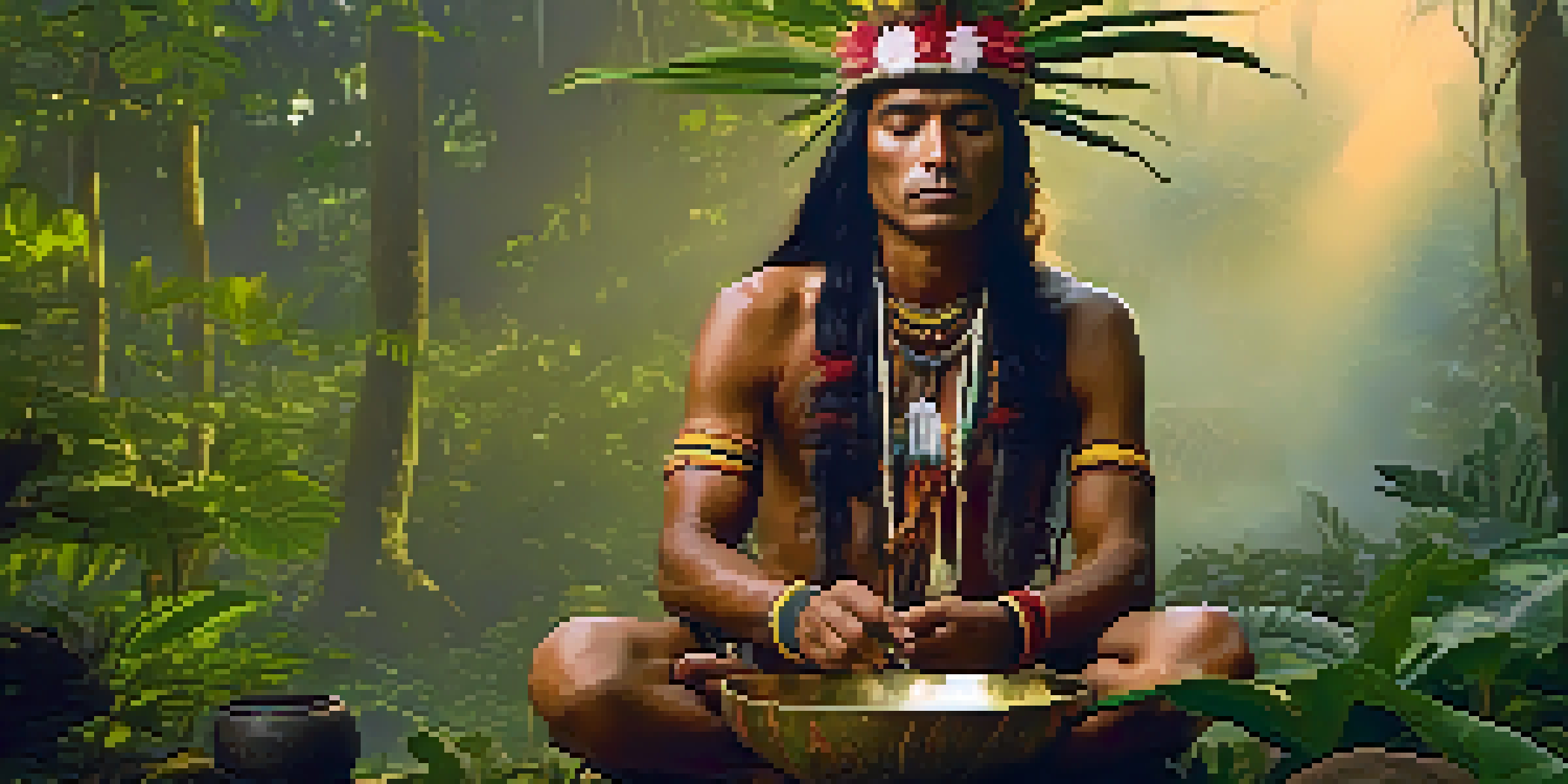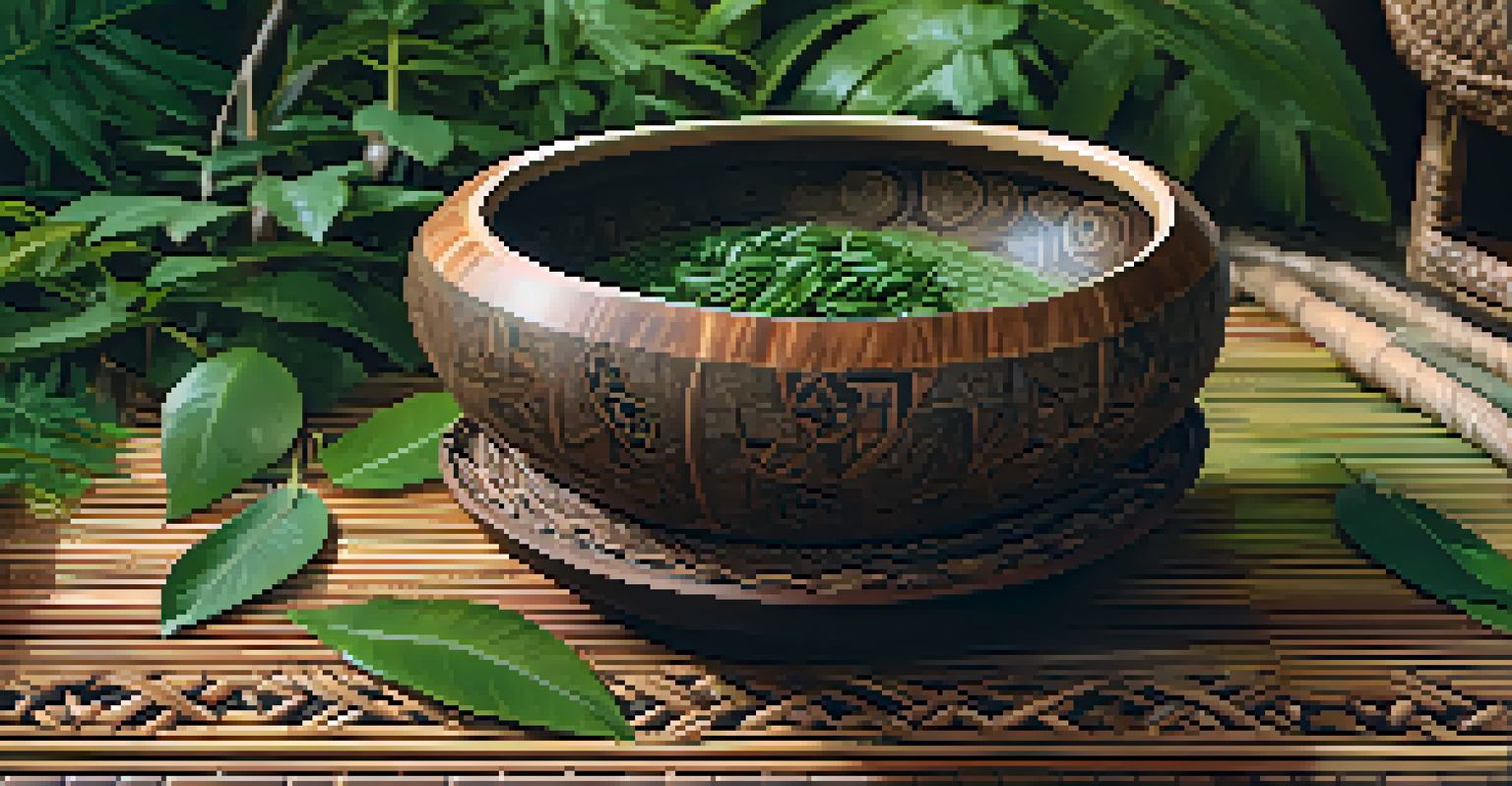Ayahuasca as a Cultural Artifact: Historical Insights

Understanding Ayahuasca: Origins and Cultural Context
Ayahuasca, a powerful brew made from the Banisteriopsis caapi vine and the Psychotria viridis leaf, has deep roots in South American indigenous cultures. Its use dates back thousands of years, primarily among the Amazonian tribes who regarded it as a sacred tool for healing and spiritual exploration. This brew is not merely a substance; it's a cultural artifact that embodies the traditions, beliefs, and rituals of the societies that utilize it.
The plant is the teacher, and the shaman is the guide.
For many indigenous people, Ayahuasca is a means to connect with the spiritual world, offering insights into their lives and the universe. The rituals surrounding its consumption often involve music, chanting, and the presence of a shaman, who guides participants through their journeys. This rich cultural context elevates Ayahuasca beyond just a psychedelic experience, framing it as a vital component of communal identity and heritage.
As more people become aware of Ayahuasca's significance, it has gained popularity outside its traditional settings. However, this global interest raises questions about cultural appropriation and the need to respect the indigenous practices and beliefs associated with the brew. Understanding Ayahuasca's origins is crucial for appreciating its role as a cultural artifact.
Ayahuasca in Indigenous Healing Practices
Indigenous healers, often referred to as shamans, have used Ayahuasca for centuries to treat various ailments. This brew serves as a spiritual medicine, providing both physical and psychological healing. Through guided ceremonies, shamans facilitate a connection to the plant spirits, allowing individuals to confront personal traumas or health issues that may be affecting their well-being.

The healing process is deeply intertwined with the community's cultural narratives. For instance, many tribes believe that the visions experienced during an Ayahuasca journey can reveal the root causes of ailments, leading to deeper understanding and healing. This holistic approach to health contrasts sharply with Western medicine, which often focuses on the physical rather than the spiritual or emotional.
Ayahuasca's Cultural Significance
Ayahuasca is a sacred brew deeply rooted in indigenous traditions, used for healing and spiritual exploration.
Moreover, the communal aspect of Ayahuasca ceremonies fosters a sense of belonging and support among participants. As individuals share their experiences, they strengthen their connections with one another and their culture, reinforcing the importance of collective healing. Thus, Ayahuasca acts not only as a remedy but also as a catalyst for cultural preservation and community cohesion.
The Role of Ayahuasca in Spiritual Exploration
Ayahuasca is revered for its ability to facilitate profound spiritual experiences. Participants often report encountering visions, gaining insights into their lives, and connecting with a higher consciousness. These experiences can lead to significant personal transformations, prompting individuals to reassess their values and life choices.
Ayahuasca is a gateway to self-discovery, revealing the interconnectedness of all life.
In many traditions, the brew is seen as a teacher, offering lessons that extend beyond the ceremony itself. This idea of Ayahuasca as a guide reflects a broader philosophy that emphasizes the importance of inner exploration and self-discovery. For many, these journeys provide clarity and direction in their lives, acting as a bridge between the physical and spiritual realms.
However, it's essential to approach these experiences with respect and intention. Ayahuasca should not be viewed merely as a recreational substance but rather as a sacred tool that requires proper guidance and understanding. This perspective reinforces the importance of cultural context and the need for respectful engagement with the traditions surrounding Ayahuasca.
Globalization and the Spread of Ayahuasca Practices
In recent decades, Ayahuasca has transcended its indigenous roots and gained global recognition. Retreat centers offering Ayahuasca ceremonies have popped up in various countries, attracting seekers from all walks of life. This globalization of Ayahuasca practices raises both opportunities and challenges for the communities that have historically safeguarded this sacred brew.
While the international interest in Ayahuasca can provide economic benefits to indigenous communities, it also risks commodifying a deeply spiritual practice. As outsiders participate in these ceremonies, there is a growing concern about the dilution of traditional practices and the potential for exploitation. It's vital for retreat centers to honor the cultural heritage of Ayahuasca and ensure that indigenous voices remain central in these discussions.
Therapeutic Potential of Ayahuasca
Research suggests Ayahuasca may alleviate mental health issues like depression and PTSD, highlighting its therapeutic benefits.
Moreover, the spread of Ayahuasca practices has sparked a dialogue on cultural appropriation. As more people engage with Ayahuasca, understanding its cultural significance becomes crucial. This awareness can foster deeper respect for indigenous traditions and promote responsible practices that honor the roots of this remarkable cultural artifact.
Ayahuasca and the Quest for Mental Health
In addition to its cultural and spiritual significance, Ayahuasca is increasingly being recognized for its potential therapeutic benefits in mental health. Research has indicated that the brew may help alleviate symptoms of depression, anxiety, and PTSD. This emerging interest has prompted scientists to explore how Ayahuasca-induced experiences can lead to lasting psychological changes.
The therapeutic use of Ayahuasca often involves structured ceremonies that promote introspection and emotional release. Many participants describe feeling a renewed sense of purpose and emotional clarity after their experiences. This highlights how Ayahuasca can be a powerful tool for those seeking healing and personal growth.
However, it's important to approach Ayahuasca therapy with caution. While many report positive outcomes, the brew may not be suitable for everyone, particularly those with certain mental health conditions or a history of substance abuse. Ensuring that participants are adequately screened and supported during their journeys is crucial for safe and effective use of Ayahuasca in therapeutic settings.
Ethical Considerations in Ayahuasca Ceremonies
As Ayahuasca practices gain popularity, ethical considerations surrounding its use become increasingly important. One major concern is the need to protect indigenous knowledge and practices from exploitation. Many indigenous groups feel that their traditional ceremonies are being commercialized, leading to a disconnect from their cultural roots.
Moreover, there is a growing awareness of the need for informed consent and safety in Ayahuasca ceremonies. Participants should be fully informed about what to expect during their experience and any potential risks involved. This responsibility falls on both the facilitators and the participants to ensure that the ceremonies are conducted respectfully and ethically.
Ethics in Ayahuasca Practices
The rise in Ayahuasca's popularity necessitates ethical considerations to protect indigenous practices and ensure participant safety.
Additionally, fostering respectful relationships between practitioners and indigenous communities is vital. This can involve supporting local economies, engaging in cultural exchange, and honoring the traditions that have been passed down for generations. By prioritizing ethical practices, we can help maintain the integrity of Ayahuasca as a cultural artifact.
The Future of Ayahuasca as a Cultural Artifact
The future of Ayahuasca as a cultural artifact is a complex tapestry woven with threads of tradition, globalization, and ethical considerations. As more people seek out Ayahuasca for its healing and spiritual benefits, the challenge lies in balancing accessibility with respect for its indigenous origins. Ongoing dialogue among practitioners, researchers, and indigenous communities will be crucial in shaping this future.
Moreover, as scientific research continues to explore the therapeutic potential of Ayahuasca, it may lead to greater understanding and acceptance of its role in mental health. This could pave the way for integrating traditional practices with modern therapeutic approaches, benefiting both indigenous and global communities alike.

Ultimately, the journey of Ayahuasca as a cultural artifact is a shared responsibility. By fostering a culture of respect, understanding, and collaboration, we can honor the rich traditions surrounding Ayahuasca while also embracing its transformative potential in today's world.